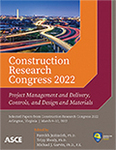The Effect of the Economic and Social Motivations on Knowledge Sharing Behavior in Megaprojects: A Mediating Effect of Environmental Dynamism
Publication: Construction Research Congress 2022
ABSTRACT
Knowledge sharing behavior is considered to accelerate information exchange among stakeholders and promote project performance in megaprojects. The motivations of megaproject stakeholders to implement knowledge sharing behavior could be divided into two classifications: economic motivation and social motivation. Environmental dynamism is often considered as unpredictable events in the environment, such as significant technological changes, boycotts by environmentalists, and so on, which could influence the effect of economic motivation and social motivation on knowledge sharing behavior in the megaproject. This paper investigates whether environmental dynamism mediates the effects and to what extent this relationship is strengthened or weakened. A total of 188 professionals participating in various megaprojects were interviewed through the questionnaire survey, and the Smart Partial least squares regression (PLS) technique was employed to analyze the data. Hierarchical regression results suggest that environmental dynamism has a strong moderating effect on the relationship between social motivation and knowledge sharing behavior. The findings contribute to understanding the effect of environmental dynamism on knowledge sharing behavior.
Get full access to this article
View all available purchase options and get full access to this chapter.
REFERENCES
Aaltonen, K., and Kujala, J. (2016). “Towards an improved understanding of project stakeholder landscapes.” International Journal of Project Management, Elsevier Ltd and Association for Project Management and the International Project Management Association, 34(8), 1537–1552.
Aerts, G., Dooms, M., and Haezendonck, E. (2017). “Knowledge transfers and project-based learning in large scale infrastructure development projects: an exploratory and comparative ex-post analysis.” International Journal of Project Management, 35(3), 224–240.
Aiken, L. S., West, S. G., and Reno, R. R. (1991). Multiple regression: Testing and interpreting interactions. sage.
Arevalo, J. A., Aravind, D., Ayuso, S., and Roca, M. (2013). “The Global Compact: An analysis of the motivations of adoption in the Spanish context.” Business Ethics, 22(1), 1–15.
Azadegan, A., Patel, P. C., Zangoueinezhad, A., and Linderman, K. (2013). “The effect of environmental complexity and environmental dynamism on lean practices.” Journal of Operations Management, 31(4), 193–212.
Cao, D., Li, H., Wang, G., and Zhang, W. (2016). “Linking the Motivations and Practices of Design Organizations to Implement Building Information Modeling in Construction Projects: Empirical Study in China.” Journal of Management in Engineering, 32(6), 04016013.
Carnahan, S., Agarwal, R., and Campbell, B. (2010). “The Effect of Firm Compensation Structures on the Mobility and Entrepreneurship of Extreme Performers.” Business, 203(October), 1–43.
Chen, G., and Liu, W. (2017). “Organizational Internal Learning, External Learning and Organizational Performance in corporations: The Moderating Role of Organizational Structure and Environmental Dynamics.” Chinese Journal of Management Science, 25(5).
Chun, W. C. (2000). “Working with knowledge: how information professionals help organisations manage what they know.” Library Management, 21(8), 395–403.
Clarke, T., and Rollo, C. (2001). “Corporate initiatives in knowledge management.” Education + Training, 43(4), 206–214.
Dost, M., Pahi, M. H., Magsi, H. B., and Umrani, W. A. (2019). “Effects of sources of knowledge on frugal innovation: moderating role of environmental turbulence.” Journal of Knowledge Management, 23(7), 1245–1259.
Field, A. P. (2004). Discovering statistics using SPSS. Sage, London.
Gavronski, I., Ferrer, G., and Paiva, E. L. (2008). “ISO 14001 certification in Brazil: motivations and benefits.” Journal of Cleaner Production, 16(1), 87–94.
Gee-Woo, B., Jae-Nam, L., Robert, W. Z., and Kim, Y.-G. (2011). “Behavioral intention formation in Knowledge Sharing: Examining the Roles of Extrinsic Motivators, and Organizational Climate.” MIS Quarterly, 29(1), 87–111.
Grewal, R., Comer, J. M., and Mehta, R. (2001). “An investigation into the antecedents of organizational participation in business-to-business electronic markets.” Journal of Marketing, 65(3), 17–33.
Hai, B., Liuyang, Z., and Gupeng, Z. (2017). “Research on the Relationship between Knowledge Acquisition Knowledge Leakage and Firm ’ s Innovation Performance.” soft science studies.
Hair, J. F., Black, W. C., Babin, B. J., and Anderson, R. E. (2010). Multivariate data analysis. Pearson Prentice Hall, Upper Saddle River, NJ.
Haldin-Herrgard, T. (2000). “Difficulties in diffusion of tacit knowledge in organizations.” Journal of Intellectual Capital, 1(4), 357–365.
Jansen, J. J. P., Vera, D., and Crossan, M. (2009). “Strategic leadership for exploration and exploitation: The moderating role of environmental dynamism.” Leadership Quarterly, Elsevier Inc., 20(1), 5–18.
Kamara, J. M., Augenbroe, G., Anumba, C. J., and Carrillo, P. M. (2002). “Knowledge management in the architecture, engineering and construction industry.” Construction Innovation, 2, 53–67.
Miller, D. (1987). “The structural and environmental correlates of business strategy.” Strategic Management Journal, 8(1), 55–76.
Miller, D., and Friesen, P. H. (1983). “Strategy‐making and environment: The third link.” Strategic Management Journal, 4(3), 221–235.
Podsakoff, P. M., MacKenzie, S. B., Lee, J. Y., and Podsakoff, N. P. (2003). “Common Method Biases in Behavioral Research: A Critical Review of the Literature and Recommended Remedies.” Journal of Applied Psychology, 88(5), 879–903.
Smith, E. A. (2001). “The role of tacit and explicit knowledge in the workplace.” Journal of Knowledge Management, 5(4), 311–321.
Teerajetgul, W., and Chareonngam, C. (2008). “Tacit knowledge utilization in Thai construction projects.” Journal of Knowledge Management, 12(1), 164–174.
Wang, G., He, Q., Xia, B., Meng, X., and Wu, P. (2018). “Impact of Institutional Pressures on Organizational Citizenship Behaviors for the Environment: Evidence from Megaprojects.” Journal of Management in Engineering, 34(5), 04018028.
Information & Authors
Information
Published In
History
Published online: Mar 7, 2022
Authors
Metrics & Citations
Metrics
Citations
Download citation
If you have the appropriate software installed, you can download article citation data to the citation manager of your choice. Simply select your manager software from the list below and click Download.
